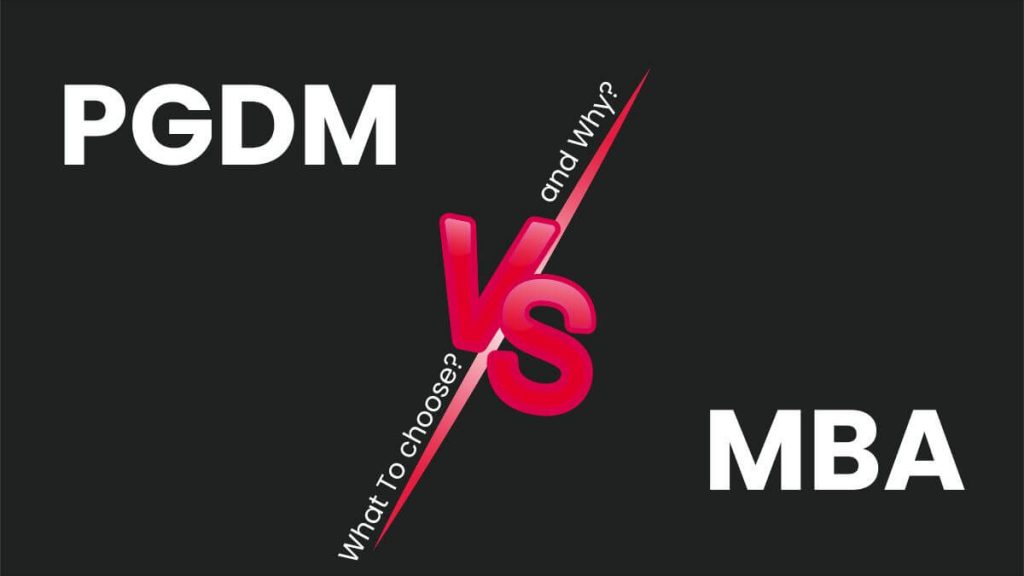If you are interested in pursuing a career in business management, you have probably come across the terms PGDM vs MBA. Both are postgraduate degree programs in management, but there are some differences between the two that you should be aware of before making a decision.
PGDM stands for Post Graduate Diploma in Management, and it is offered by autonomous institutes, while MBA stands for Master of Business Administration and is offered by universities. In this blog, we will explore the differences between PGDM and MBA, the benefits of each, and which one may be the right choice for you. So, whether you’re a student or a professional for an answer to what career should I choose, this guide will help you make an informed decision about PGDM vs MBA.
- Key Takeaways
- PGDM vs MBA? What's the difference?
- PGDM vs MBA! What to pursue?
- PGDM vs MBA! The actual difference
- Factors to consider before choosing a program
- Advantages of PGDM
- Disadvantages of PGDM:
- Advantages of MBA:
- Disadvantages of MBA:
- Top institutes providing PGDM Certification in India
- Top institutes providing MBA Certification in India
- To conclude
Key Takeaways
- PGDM: Industry-oriented, practical focus, shorter duration.
- MBA: Academic, theoretical approach, longer duration.
- Consider curriculum, specializations, institution reputation, and career goals.
- Both are valued, leading to diverse opportunities.
PGDM vs MBA? What’s the difference?
PGDM (Post Graduate Diploma in Management) and MBA (Master of Business Administration) are postgraduate degree programs in management. PGDM is a diploma program that is offered by autonomous institutes that are recognized by the All India Council for Technical Education (AICTE).
On the other hand, MBA is a degree program offered by universities. Both programs cover similar topics such as finance, marketing, operations, and human resources. However, PGDM programs are more industry-oriented and focus on practical knowledge, while MBA programs are more academic and theoretical in nature. Overall, both degrees are highly valued in the business world and can open up various career opportunities.
PGDM vs MBA! What to pursue?
Pursuing a PGDM or MBA degree is essential for individuals looking to advance their careers in the business world. These postgraduate programs equip students with the necessary skills and knowledge to excel in leadership and managerial roles.
The curriculum of these programs covers various aspects of business management such as finance, marketing, operations, human resources, and more.
Moreover, students have the opportunity to develop problem-solving, decision-making, and communication skills through case studies, group projects, and internships. A PGDM or MBA degree is highly valued by employers, as it signifies a commitment to learning and a strong work ethic.
PGDM vs MBA! The actual difference
The structure and curriculum of PGDM vs MBA programs may vary depending on the institution offering them, but here are some general features:
- Curriculum: Both PGDM and MBA programs cover various aspects of business management such as finance, marketing, operations, human resources, and more. However, PGDM programs are more industry-oriented and focus on practical knowledge, while MBA programs are more academic and theoretical in nature.
- Electives: Both programs offer students the opportunity to choose electives in areas of their interest. PGDM programs are more flexible in this aspect and allow students to choose from a wide range of electives that meet industry demands.
- Internship: Both programs offer students the opportunity to gain practical experience through internships. PGDM programs usually have a mandatory internship requirement, while MBA programs may or may not have this requirement.
- Duration: PGDM programs are typically shorter in duration, ranging from 1-2 years, while MBA programs are generally longer, ranging from 2-3 years.
- Structure: PGDM programs are structured to be more hands-on, with a focus on practical knowledge, case studies, and industry projects, while MBA programs are more structured around classroom lectures and academic research.
Factors to consider before choosing a program

Personal career goals and aspirations
If your career goals are aligned with a particular industry or domain, it may be beneficial to choose a PGDM program that specializes in that area, as they offer more industry-oriented knowledge and practical exposure. On the other hand, if you are interested in pursuing an academic career or want a more general management education, an MBA program may be a better choice.
Institution reputation and ranking
In terms of institution reputation and ranking, it is important to research and choose an institution that is well-regarded in the industry and has a strong alumni network. Both PGDM and MBA programs offered by reputed institutions are highly valued by employers.
Specializations and electives offered
The availability of specializations and electives is also an important factor to consider. PGDM programs usually offer a wider range of specializations and electives that are tailored to meet industry demands, while MBA programs may offer more standardized electives.
Industry demand and relevance
Finally, it is essential to consider the demand and relevance of the program in the industry. PGDM vs MBA degrees are highly valued, it is important to research and understand the current industry trends and demands before making a decision.
It is important to research and choose a program that aligns with your career goals and provides you with the necessary skills and knowledge to excel in your chosen field.
Advantages of PGDM
- Industry-oriented curriculum: PGDM programs are designed to be more industry-oriented, with a focus on practical knowledge and skills that are directly relevant to the needs of the industry.
- Flexibility: PGDM programs are more flexible in terms of curriculum and can be customized to meet industry demands.
- Specialization options: PGDM programs offer a wide range of specializations and electives that allow students to focus on a particular area of interest or expertise.
- Exposure to industry: PGDM programs often require students to complete internships or industry projects, providing them with hands-on experience and exposure to the industry.
Disadvantages of PGDM:
- Recognition: PGDM programs are not recognized by the University Grants Commission (UGC) and are only recognized by the All India Council for Technical Education (AICTE).
- Limited academic research: PGDM programs focus more on practical knowledge and skills, and may not provide as much exposure to academic research and theories.
- Duration: PGDM programs are usually shorter in duration than MBA programs, which may not provide students with enough time to develop a broad range of skills.
Advantages of MBA:
- Recognized degree: MBA programs are recognized by the University Grants Commission (UGC) and are offered by reputed universities, providing students with a recognized degree.
- A broad range of skills: MBA programs offer a broad range of skills and knowledge in various areas of business management, which can be beneficial for those looking for more general management education.
- Strong alumni network: MBA programs offered by reputed universities often have a strong alumni network that can provide students with career opportunities and guidance.
Disadvantages of MBA:
- Limited specialization options: MBA programs may not offer as many specialization options as PGDM programs, which may not be suitable for students looking to focus on a particular area of interest or expertise.
- Academic-oriented curriculum: MBA programs may be more academic and theoretical in nature, which may not provide as much exposure to practical knowledge and skills.
- Standardized curriculum: MBA programs have a standardized curriculum that may not be as flexible as PGDM programs, which may not be suitable for students looking to customize their education.
Overall, the advantages and disadvantages of PGDM vs MBA programs depend on an individual’s career goals and preferences. While PGDM programs are more industry-oriented and flexible, MBA programs offer a broader range of skills and knowledge and are recognized by reputed universities.
Top institutes providing PGDM Certification in India
- IMT Ghaziabad – Institute of Management Technology, Ghaziabad.
- Berhampur University – Berhampur University, Berhampur.
- IMS Ghaziabad – Institute of Management Studies, Ghaziabad.
- MDI Gurgaon – Management Development Institute, Gurgaon.
- IMS Noida – Institute of Management Studies, Noida.
- IMI Delhi – International Management Institute, Delhi.
- XLRI Jamshedpur – XLRI-Xavier School of Management, Jamshedpur.
- IMI Kolkata – International Management Institute, Kolkata.
- NMIMS Bangalore – Narsee Monjee Institute of Management Studies.
- IMT Nagpur – Institute of Management Technology, Nagpur.
Top institutes providing MBA Certification in India
- IIM Calcutta
- IIM Bangalore
- IIM Ahmedabad
- IIM Indore
- IIM Kozhikode
- IIM Lucknow
- XIM University
- SCMHRD Pune: Symbiosis Centre For Management And Human Resource Development
- SIBM Pune: Symbiosis Institute Of Business Management
- SPJIMR Mumbai: SP Jain Institute of Management and Research
- ISB Hyderabad: Indian School of Business
- FMS New Delhi Faculty of Management Studies
To conclude
In conclusion, the debate between PGDM and MBA is not a new one, but it still holds relevance in today’s education landscape. Both courses have their unique features and offer great learning opportunities to students. PGDM programs are more industry-oriented, flexible, and constantly updated to meet the needs of the changing business world, while MBA programs are more traditional and theoretical, with a broader curriculum.
Choosing between the two ultimately depends on an individual’s career goals and preferences. It’s crucial to consider factors like the institute’s reputation, course curriculum, faculty, placement opportunities, and fees before making a decision.
In the end, it’s essential to understand that both PGDM and MBA courses offer great learning opportunities and can help one achieve their career goals. The key is to do thorough research, identify one’s career objectives, and choose the course that aligns with those objectives.

13+ Yrs Experienced Career Counsellor & Skill Development Trainer | Educator | Digital & Content Strategist. Helping freshers and graduates make sound career choices through practical consultation. Guest faculty and Digital Marketing trainer working on building a skill development brand in Softspace Solutions. A passionate writer in core technical topics related to career growth.




